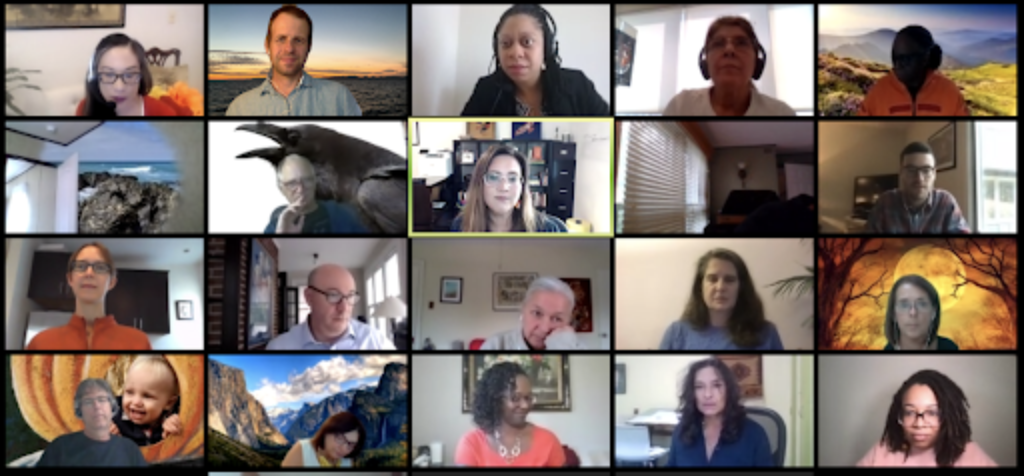By Tim Mok, Kerry Hastings and Ron Milam, Smart Growth California
We’re excited to share this cross post, which originally appeared on the Smart Growth California blog. To learn more about Smart Growth California, an initiative of The Funders Network, visit their website here.
Transit Justice is Racial and Climate Justice
On October 1st, 2020, the Los Angeles Funders’ Collaborative, a workgroup of Smart Growth California hosted a virtual conversation with transit justice leaders in Los Angeles. Below are some key highlights:
David Bragdon, Executive Director of Transit Center, who moderated the panel, noted that advancing racial and climate justice require us to also push for just transit systems that serve everyday riders. The intersection is inevitable.
Chanell Fletcher, Executive Director of ClimatePlan grounded the discussion by outlining California’s legacy problem of underfunding public transportation, while prioritizing roads and highways that have segregated and displaced communities. Highway and road infrastructure was designed with racial segregation in mind, and has left it’s mark today with black and brown communities breathing toxic air and bearing disproportionate health impacts. How can we respond? Inspired by Black Lives Matter and defunding the police, we can move towards defunding road projects and reallocating resources into public transportation. Better public transportation for riders including black and Latinx women, can better connect them to good jobs, and a path towards economic mobility. Increased transit ridership can also reduce CA’s carbon footprint, and help achieve the state’s aggressive climate goals.

Laura Raymond, Director of ACT-LA, attested that transit-dependent Angelenos, particularly bus riders, have been burdened by decades of disinvestment, and are cut off from economic opportunity. While Metro LA is stewarding $160 billion towards transit, most of that funding is towards rail projects despite 70% of transit riders taking the bus. LA has also seen an increase in policing by transit, “a practice rife with racist discrimination,” exclaimed Raymond.
Alexandra Suh, Executive Director of Koreatown Immigrant Workers Alliance and Carla De Paz, Project Director of Community Power Collective brought focus to the intersectionality that transit plays. Transit riders are also restaurant workers, low-income renters, and undocumented immigrants, but a transit policy win touches on every justice issue beyond the bus. Community power in Boyle Heights has held Metro accountable for the development of public land, which impacts street vendors, bus riders and how the community interacts with the environment. CPC secured affordable housing on eight Metro-owned lots, and is leading anti-gentrification initiatives.
LA is mobilizing, the #PeoplesTransit campaign, spearheaded by ACT-LA, KIWA, CPC and over a hundred other organizations are advancing racial, climate and transit justice now. Last June, a motion passed with Metro’s Board instructing a task force of community-based organizations to move money out of policing and towards community alternatives to safety. The campaign is drafting those alternatives now and simultaneously fighting bus service cuts. A Transit Oriented Communities Implementation Plan is going to Metro’s Board this month, centered on housing and anti-displacement policy along every rail and bus line.
Intersectional partnerships are critical to move towards a just transition, and improved outcomes for all people.
 Leaning on Relationships & Trust to Advance Equity and Impact
Leaning on Relationships & Trust to Advance Equity and Impact
In the last several years, some in philanthropy have risen to the challenge of asking deeper questions around equity in their giving practices. Whether using a participatory grantmaking framework, trust-based philanthropy principles, or a deeper equity-analysis, many funders have embarked on a journey to have more equitable relationships with grantees and unravel some of the innate power dynamics at play.
On October 20th, funders gathered together to hear how two foundations – the Legler Benbough Foundation in San Diego and the Compton Foundation based out of the Bay Area – are implementing these practices, and what they are learning along the way. Each foundation puts relationships front and center, and works to lighten the burden on grantees through individualized check-ins as opposed to labor-intensive grant reports.
Legler Benbough, a spenddown place-based foundation, has built close relationships with partners and provides mentorship and guidance when needed, as well as flexibility with grant logistics based on the needs of each organization. Compton Foundation is a national funder and therefore cannot visit partners in person, but has check-in calls and works to trust that their partners’ movement-building and narrative work, while at times difficult to measure, is moving the needle on change.
Both foundations approach their relationship with grantees from a position of listening and trusting that folks on the ground know the issues and solutions that are best for their community, and that their role as funders is to equip them with various resources and then step back to let them lead. This session was hosted in partnership with the Environmental Grantmakers Association and facilitated by the Trust-Based Philanthropy Project. If you are interested in going deeper in the six trust-based philanthropy principles on a future call, contact kerry@fundersnetwork.org.
The Funders Network Learning Webinars
TFN, the national funder network that Smart Growth is a part of, also continues hosting their own monthly learning webinars. Two of these recent sessions lifted up issues relevant to funders in California. The first, How We Move: New Polling Data on Transportation, lifted up research relevant to the mobility fund, which just granted it’s first $700,000 to groups around the country, including California. Another convening, Haciendo el Cambio: How Latinx Communities are Harnessing Power and Building Alliances for Climate Justice, lifted up work taking place in California.
For a link to these webinar recordings, email Ron Milam. To learn about upcoming convenings hosted by Smart Growth California and The Funders’ Network, check out our events page. Also mark your calendar for TFN’s 2021 Virtual Conference March 15-17, 2021. Smart Growth California has several sister working groups at TFN that California funders may be interested in, including:
